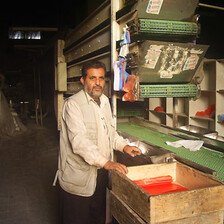The Electronic Intifada 20 May 2024

Injured Palestinians are brought to al-Aqsa Martyrs Hospital in Deir al-Balah for treatment following the Israeli attacks on al-Bureij camp in the central Gaza Strip, 6 May 2024. (Ali Hamad / APA Images)
I remember my last week working as a nurse at the European Gaza Hospital in Khan Younis, in November 2023.
Israel had been attacking Gaza nonstop since October, and the hospital was overflowing with people injured by these attacks. My workload was at capacity, but I paid particular attention to Ghazal, a 4-year-old girl who came under my care.
Ghazal’s home had been attacked by Israel, and her entire family had been killed.
I was bandaging her wounds and she told me that, before the bombing, her father had left the house to buy her pajamas, a pair of shoes and a doll for her birthday.
She asked me where her father was, and I could not respond.
In fact, her father had been at the entryway of their building when he was martyred.
Ghazal was the only survivor in her family.
I suppressed all emotions at that moment and continued to treat her. When I left the room, I broke down and released all the tears that I had held back.
I thought that I would never stop crying.
Emotional and mental devastation
On my last day as a nurse at the European Hospital, I bought a pair of pajamas and shoes and a doll for Ghazal. I handed her the gift and said goodbye.
Anxiety has haunted me since I left work in November, not necessarily from the bloody scenes I saw, but from the emotional devastation that Israel’s attacks have caused in us all.
I simply couldn’t bear facing these emotions every day, but they are inevitable now.
My family has been displaced six times since October. We are now in Rafah.
I had lost all my desire to live at that point. Our last displacement was on foot, and I stood in the middle of the road wanting to walk back to Khan Younis, to my home, not to a new place to take shelter.
I didn’t even care about dying.
Each day I experience and see things that I’ve never seen before. A professor from my university, a doctor, selling canned goods in the street to provide for his family.
How have we reached this point?
How do we bear going to bed hungry and having our children do the same?
What keeps us alive
In our tent in Rafah, we share stories and memories to pass the time. We also share tips on how to get through the days.
Do not drink too much water so you don’t have to go to the bathroom.
Save your leftover coffee for the next day.
Save the dishwashing water to clean our floors.
Do not throw away anything. Save all containers to light fires for cooking.
Stuff a bag full of clothes to use like a pillow.
Save lids from jams and preserves to use as plates.
One day, a friendly woman from another tent came by to share with us khubeza, an edible leafy green.
We shared our memories of eating this food in the past. I hadn’t expected to eat fresh greens in months, and the sight of khobeza was a delight.
Many of my family members did not like it, but we all ate it like it was a hearty dish of mansaf. My sister Rula, who is picky about food, devoured the greens.
Our bodies had become so accustomed to canned food that we had started to crave anything fresh and from the earth. Eating khubeza provided more nourishment than any meal from an aid package could ever provide.
Before October, you could collect khubeza from the ground. The land was filled with it every winter, clean and shiny and tender.
Now there is no land, no plentiful khubeza, no vegetables. Our water wells are destroyed, our farms are burned and poisoned.
Khubeza, when we find it, is our joy now. Some women in the camp cook the leaves without chopping it.
Others chop it a little and cook it with some wheat berries and call it maftoul.
If the occupation had not destroyed our livelihoods, our infrastructure, our water, then we might not have to subsist on canned goods. But this situation is only temporary, our land is forever.
This lonely world
The war has changed all of us, every aspect of our lives.
I wake up early now and start the fire to boil my coffee. I knead and bake my own bread.
After so many years of depending on others, on businesses, for these things, I now take care of them myself.
In other words, I’ve become good at doing everything.
I do avoid mirrors, though, because I am afraid of what I might see. I know I have lost weight, but I wonder if my face has become as pale as my sister’s, if I have dark circles under my eyes.
I write and know that our lives are not important to this lonely world. I know that we have no value in a silent world. My whole life is small in front of me.
Dina Hussam al-Banna lives in Gaza.



